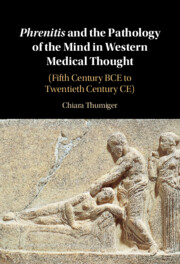Acknowledgements
The list of people to thank for help, assistance and support received over the seven years since I began this project is very long. The bulk of the project was generously financed by a three-year Research Fellowship in Medical Humanities from the Wellcome Trust (Grant Number 108701/Z/15/Z), hosted by the University of Warwick; I am very grateful to both institutions for sponsoring me and for their general support, and in particular to Simon Swain as my primary host there. The Humboldt University (HU) in Berlin and the research group ‘Medicine of the Mind, Philosophy of the Body’ headed by Philip van der Eijk in the Institut für Klassische Philologie have been a great place to work and have supported me in many practical matters over the past ten years. I should also thank the CMG library, and Roland Wittwer for his kindness and help with my bibliographical needs. Last but not least, the DFG-sponsored Cluster of Excellence Roots at the CAU University in Kiel has been my academic home for the past three years, financing my research and providing support and occasions for lively exchange, for which I am also grateful. The final revisions of this work were done there, and thanks to its support.
I have benefited immensely from a variety of individual conversations and friendships while working on phrenitis, and I should mention the most decisive of them. Philip van der Eijk first inspired me to look more deeply into the history of phrenitis. Under his supervision, Glenda McDonald had written her PhD thesis on this topic, a thorough study of a selection of authors which provided a firm basis for me to begin my work. I thank her for our initial exchanges. Philip has been a constant presence in my work, as mentor and friend, and my debt to him grows ever greater. Simon Swain at Warwick was decisive with his enthusiastic reception of my research plan, first of all, and with support for my Wellcome application, which he helped to make successful. Throughout the years he has read and closely commented on my drafts at crucial stages and provided help on the Arabic sources and on all kinds of questions in the history of ancient medicine, offering important insights, as well as encouragement and practical advice. Individual readers have helped in many ways by looking at my text and offering comments and corrections on particular topics, here in approximate chronological order: Babylonian medicine (Ulrike Steinert); Talmudic medicine (Lennart Lemhaus); the translation of Galenic texts (especially P. N. Singer, and Christine Salazar, who is very much missed); early Christian sources (Jessie Wright, whose new work on the brain and phrenitis in Christian theology I discovered only at a late stage; Ioannis Papadogiannakis on Theodoret and other coeval authors); the Arabic, Hebrew and Syriac translations (Ignacio Sanchez, who closely checked the translations I needed to use; Peter Pormann, Simon Swain, Oliver Overwien and Uwe Vagelpohl for help on various passages; Gerrit Bos, who shared his then unpublished editions of Maimonides and other texts with me); philosophical and medical-historical questions, and linguistic points of all kinds, on different chapters (Hynek Bartoș, Sean Coughlin, Orly Lewis, Lorenzo Perilli and Amneris Roselli); late-antique and Byzantine materials (Ricarda Gäbel, who shared her work on Aetius of Amida and diseases of the brain with me before publication; Petros Bouras-Vallianatos); medieval sources (Fernando Salmón, without whose help and precious time I would simply not have managed to find my way among the medieval sources on phrenitis, and also for sharing his work on Arnau de Vilanova; Iolanda Ventura, who was also very generous with her time, and whose expert tips and advice made it possible for me to start researching the texts of the Salernitan School; Claire Trenery for more examples from her work on madness in the Middle Ages); modern history of psychiatry (Greg Eghigian and Germán Berrios); history of medicine and ancient intellectual and material history more broadly (William V. Harris, George Kazantzidis, Laurence Totelin, on pharmacological ingredients and much more; Glen M. Cooper on astrology and medicine); finally, the anonymous reader at Cambridge University Press, whom I fear I have not entirely satisfied, but whose sharp criticism, I believe, has still improved the final result and taught me a great deal. Last but not least, I thank S. Douglas Olson for reading my text and improving its English presentation. In the process, Douglas masterfully checked and helped correct a number of Greek and Latin interpretations, saving me from slips and mistakes. Some must surely remain, which is entirely my fault, but I know that I am immensely lucky to be able to count on this level of support and feedback.
Several audiences offered comment and insights, and I can only mention them collectively. I benefitted greatly from feedback given at various events where I presented sections of this book, especially and repeatedly in Berlin (HU) as well as at Warwick, London, Durham, New York, Penn State, the University of Pennsylvania, Kiel, Łódź, Rome, Patras, Paris, Utrecht. Michael Sharp at Cambridge University Press, Nigel Hope who carefully copy-edited the manuscript, and the whole team were enormously helpful. Finally, to my family, Rodrigo, Stella, Luna; my parents and sisters; and my friends, many of whom I have already mentioned – thanks for everything else.

